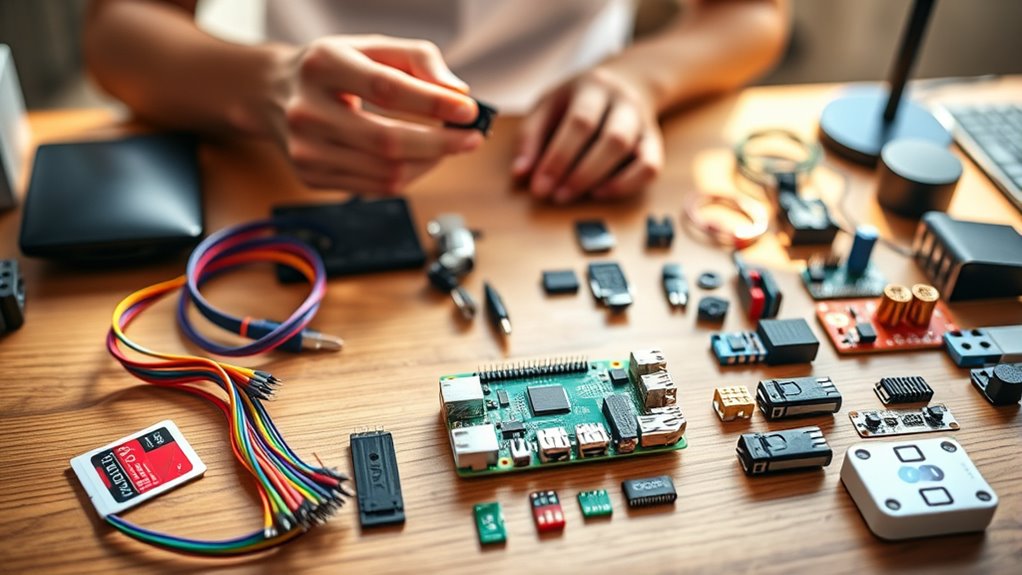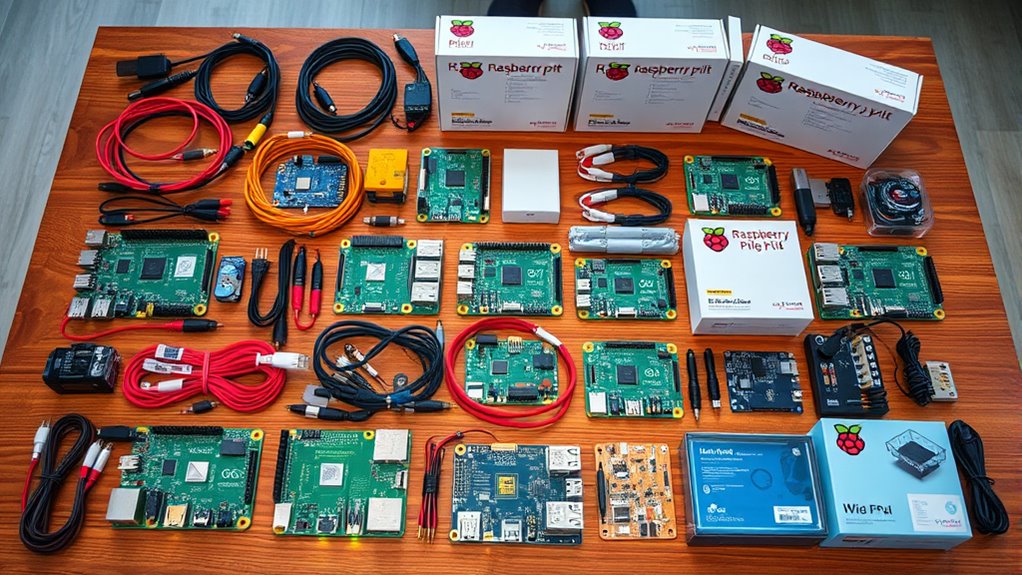If you’re looking for the top Raspberry Pi starter kits that make DIY projects easy and fun, I’ve found 15 excellent options for all skill levels. From beginner-friendly sets like Freenove’s detailed kits with tutorials to high-performance options like Seeed Studio and CanaKit PRO, there’s something for everyone. These kits include essential components, accessories, and guides that simplify setup and project development. Keep exploring, and you’ll discover how to make the most of these versatile kits for your next project.
Key Takeaways
- Choose kits with comprehensive components like GPIOs, sensors, and cases to simplify project setup and expansion.
- Opt for kits supporting multiple programming languages and detailed tutorials to enhance learning and versatility.
- Prioritize kits with pre-installed OS, ample storage, and reliable power supplies for quick, hassle-free start.
- Select high-performance kits with cooling solutions and multimedia support for advanced projects like media centers or automation.
- Consider user level and project goals—beginners benefit from beginner-friendly kits with extensive guides, while pros need advanced, customizable options.
Freenove Raspberry Pi 5 Starter Kit with 223 Items and 128 Projects
Are you a beginner or hobbyist looking to plunge into electronics and programming? The Freenove Raspberry Pi 5 Starter Kit is perfect for you. It includes 223 components like sensors, motors, displays, and wires, supporting a wide range of projects. With a detailed 962-page tutorial, you’ll learn electronics fundamentals, wiring, and coding in Python, C, Java, Scratch, and Processing. The kit offers 128 projects, from simple LEDs to complex automation, making it ideal for all skill levels. Plus, the organized six-compartment container keeps everything accessible. Overall, it’s a complete , user-friendly way to start your DIY electronics journey.
Best For: beginners, hobbyists, and students eager to learn electronics and programming with a comprehensive starter kit.
Pros:
- Includes 223 components and 128 projects, offering extensive hands-on learning opportunities.
- Supports multiple programming languages such as Python, C, Java, Scratch, and Processing for versatile skill development.
- Comes with a detailed 962-page tutorial and organized storage, making setup and learning straightforward.
Cons:
- Does not include a Raspberry Pi, so users need to purchase one separately.
- Some wires and components may be delicate or prone to bending, requiring careful handling.
- The six-compartment container might not be sufficient for all components if expanded with additional parts.
Seeed Studio Raspberry Pi 5 Starter Kit (8GB RAM)
The Seeed Studio Raspberry Pi 5 Starter Kit with 8GB RAM is an excellent choice for users seeking a powerful and versatile mini-computer right out of the box. It features the latest Raspberry Pi 5, equipped with a 2.4GHz quad-core ARM Cortex-A7 processor and 8GB of RAM, offering three times the performance of earlier models. The kit includes a 128GB SD card with Raspberry Pi OS pre-installed, an official Pi 5 case with active cooling, a 27W power supply, HDMI cable, and network cable. Perfect for various projects, from media centers to home servers, it’s ready for immediate use and customization.
Best For: tech enthusiasts and hobbyists seeking a powerful, ready-to-use mini-computer for projects, learning, or media applications.
Pros:
- Comes with 8GB RAM and a 2.4GHz quad-core ARM Cortex-A7 processor, offering excellent performance for various tasks.
- Pre-installed with Raspberry Pi OS on a 128GB SD card, enabling instant setup and use.
- Includes an official case with active cooling, power supply, and essential cables, providing a complete, ready-to-go kit.
Cons:
- Potential reliability issues with power loss recovery, which may affect continuous operation.
- Requires additional peripherals like monitor, keyboard, and mouse for full functionality.
- Slightly higher price point compared to barebones Raspberry Pi options, reflecting the kit’s comprehensive package.
CanaKit Raspberry Pi 5 Starter Kit PRO (128GB, 8GB RAM)
If you’re looking for a powerful and versatile mini-computer that can handle demanding projects, the CanaKit Raspberry Pi 5 Starter Kit PRO is an excellent choice. It features an 8GB RAM Raspberry Pi 5 with a fast 2.4GHz quad-core processor, pre-installed Raspberry Pi OS on a 128GB EVO+ Micro SD card, and a sturdy black case with efficient cooling. The kit supports dual 4K HDMI displays, WiFi 5G, Bluetooth 5.0, and gigabit Ethernet, making it ideal for media centers, automation, or development. The straightforward setup, all-inclusive accessories, and reliable performance make this kit perfect for both beginners and experienced users seeking a ready-to-use, high-performance mini-computer.
Best For: hobbyists, developers, and tech enthusiasts seeking a high-performance, versatile mini-computer for media, automation, and development projects.
Pros:
- Powerful 8GB RAM and fast quad-core processor ensure smooth multitasking and demanding applications.
- Includes pre-installed Raspberry Pi OS on a large 128GB Micro SD card for immediate use.
- Comprehensive package with cooling system, sturdy case, and all essential accessories for easy setup.
Cons:
- Some users may find the initial setup too straightforward if they prefer more customization.
- Minor issues like dead cables reported by a few customers, though replacements are simple.
- Limited to the specifications and features supported by the Raspberry Pi 5 platform, which may not suit very specialized or high-end computing needs.
Freenove Raspberry Pi 5/4/3 Zero 2 W Starter Kit (Raspberry Pi Not Included)
Designed for beginners and hobbyists, the Freenove Raspberry Pi 5/4/3 Zero 2 W Starter Kit provides an extensive introduction to electronics and programming—without the Raspberry Pi itself. It includes 223 components like sensors, motors, displays, and wires, supporting multiple Raspberry Pi models (excluding the Pi itself). The kit features a detailed 962-page tutorial with step-by-step instructions, covering wiring, circuit design, and projects in five programming languages, including Python and Scratch. With 128 projects, users can explore practical applications like LED control and sensor integration. The well-organized storage, prompt support, and all-encompassing resources make it a fantastic kit for learning and experimentation.
Best For: hobbyists, students, and beginners eager to learn electronics and programming with a comprehensive starter kit without needing a Raspberry Pi included.
Pros:
- Extensive 962-page tutorial with detailed instructions and multiple programming languages.
- Includes 223 diverse components suitable for a wide range of projects.
- Supports various Raspberry Pi models and offers prompt customer support.
Cons:
- The kit does not include a Raspberry Pi, requiring users to purchase one separately.
- Storage container may be insufficient for all components for some users.
- Some minor wires and instructions may need updates or careful handling during assembly.
SunFounder Raphael Starter Kit for Raspberry Pi 5 4B 3B B+ 400 Zero 2 W
For beginners aged 10 and up interested in exploring Raspberry Pi projects, the SunFounder Raphael Starter Kit offers an extensive, hands-on learning experience. Compatible with Raspberry Pi 5, 4B, 3B+, B+, Zero 2 W, and 400 models, it includes over 337 components supporting 161 projects and 70+ tutorial videos. The kit covers programming languages like Python, C, Java, Scratch, and Node.js, making it versatile for various skills. While it requires a separate Pi board, the exhaustive online guides and diverse hardware enable beginners to experiment confidently, from circuit design to IoT applications. It’s an excellent choice for building foundational knowledge and expanding your DIY projects.
Best For: beginners aged 10 and up who want an extensive, hands-on introduction to Raspberry Pi programming, electronics, and IoT projects.
Pros:
- Includes over 337 components supporting a wide variety of projects and learning opportunities.
- Offers comprehensive online tutorials and expert-led videos to simplify complex concepts.
- Compatible with multiple Raspberry Pi models, providing versatility for different devices and skill levels.
Cons:
- Requires a separate purchase of the Raspberry Pi board, which adds to the overall cost.
- Some hardware components, such as resistors and breadboards, may be fragile or of lower quality.
- No printed instructions; all guidance is provided online, which may be less convenient for some users.
CanaKit Raspberry Pi 4 4GB Starter PRO Kit – 4GB RAM
The CanaKit Raspberry Pi 4 4GB Starter PRO Kit is an excellent choice for beginners and hobbyists seeking a reliable, all-in-one solution to jumpstart their projects. It includes a Raspberry Pi 4 with a 1.5GHz quad-core CPU, 4GB of RAM, and a pre-loaded microSD card, making setup straightforward. The kit features high-quality accessories like a premium case with an integrated fan, heat sinks, and a low-noise CanaKit fan for effective cooling. Powering via USB-C, it supports 4K60p output through HDMI and includes a convenient PiSwitch for easy power control. Overall, it’s a versatile, ready-to-go kit perfect for media, programming, or home automation projects.
Best For: beginners, hobbyists, and students looking for a reliable all-in-one starter kit to explore computing, programming, and media projects with ease.
Pros:
- Comes with pre-loaded microSD card and all essential accessories for quick setup
- High-quality components including a premium case with integrated fan and heat sinks for effective cooling
- Supports 4K60p HDMI output, making it suitable for media streaming and multimedia applications
Cons:
- Limited storage capacity with the included microSD card, which may require upgrading for larger projects
- Initial setup issues such as HDMI connection or power supply compatibility can occur for some users
- MicroSD card capacity might be restrictive for extensive storage needs or data-heavy applications
Freenove Raspberry Pi Starter Kit (Includes 386 Items & 164 Projects)
If you’re looking to explore electronics and programming with a complete set of tools, the Freenove Raspberry Pi Starter Kit stands out as an excellent choice. It includes 386 components, sensors, and accessories compatible with most Raspberry Pi models, offering a broad range of projects—164 in total. The kit provides detailed tutorials, wiring diagrams, and code examples in multiple languages like Python, C, and Java, making it suitable for beginners and educators. Although some components may need adjustments, the extensive resources and variety of parts make this kit perfect for learning GPIO control, electronics, and programming hands-on. Just remember, the Raspberry Pi itself is sold separately.
Best For: hobbyists, students, and educators seeking a comprehensive, hands-on introduction to electronics and programming with Raspberry Pi.
Pros:
- Extensive set of 386 compatible components and 164 projects for diverse learning experiences
- Detailed tutorials and code examples in multiple programming languages, suitable for all skill levels
- High-quality educational resources that enhance understanding of GPIO control, electronics fundamentals, and programming concepts
Cons:
- Some components may have quality issues such as short wires or mislabeled parts
- The included case is considered useless; a different organizer is recommended
- The digital-only tutorials require downloads, which may be inconvenient for some learners
Vilros Raspberry Pi 4 Starter Kit (4GB, Transparent Case)
The Vilros Raspberry Pi 4 Starter Kit (4GB, Transparent Case) is an ideal choice for beginners and hobbyists looking for a complete, easy-to-assemble setup. It includes the Raspberry Pi 4 Model B, a fan-cooled transparent case, a 64GB microSD card preloaded with Raspberry Pi OS, and all necessary accessories like a power supply with an inline switch, HDMI cable, heatsinks, and a microSD to USB adapter. Designed for straightforward assembly, it offers excellent cooling with passive and active solutions. The clear case showcases the hardware, appealing to enthusiasts. Customers praise its thorough package, quick setup, and reliable performance for media, programming, and DIY projects.
Best For: beginners, hobbyists, and educators seeking a complete, easy-to-assemble Raspberry Pi 4 setup for media, programming, and DIY projects.
Pros:
- All-in-one kit with preloaded microSD card and essential accessories for quick setup
- Excellent cooling system with both passive heatsinks and active fan to maintain optimal performance
- Transparent case allows users to showcase hardware and customize their setup
Cons:
- Some users report the fan can be noisy initially and may require adjustments
- Shipping delays have been noted by a few customers, affecting delivery times
- The kit does not include peripherals like keyboard, mouse, or monitor, which are needed to complete the setup
LAFVIN Basic Starter Kit for Raspberry Pi Pico,LCD1602,SG90 with Tutorail
Designed for beginners enthusiastic to explore microcontroller projects, the LAFVIN Basic Starter Kit for Raspberry Pi Pico offers a complete package that includes an LCD1602 display, SG90 servo motor, and various sensors and components. It’s compatible with the RP2040 microcontroller and supports MicroPython, C, and Piper Make programming languages. The kit provides comprehensive tutorials and code examples, making it easy to learn circuit building and programming basics. Users praise its value, ease of use, and variety of components, which enable projects like flashing LEDs, creating memory games, or building simple sensors. Overall, it’s an affordable and practical starter kit for anyone eager to plunge into microcontroller projects.
Best For: beginners and hobbyists eager to learn microcontroller programming, circuit building, and project development using Raspberry Pi Pico.
Pros:
- Includes a comprehensive set of components like LCD display, servo motor, LEDs, and sensors, ideal for multiple projects.
- Supports multiple programming languages (MicroPython, C, Piper Make), catering to different skill levels.
- Comes with detailed tutorials and code samples to facilitate hands-on learning and project creation.
Cons:
- Some components, such as jumper wires, may be defective or of varying quality.
- The product description incorrectly mentions Bluetooth and CDs, which do not apply to the Raspberry Pi Pico.
- Lacks detailed technical specifications for components, requiring users to research voltage and compatibility details independently.
iRasptek Starter Kit for Raspberry Pi 5 8GB RAM
The iRasptek Starter Kit for Raspberry Pi 5 with 8GB RAM is perfect for both beginners and experienced users seeking a high-performance, ready-to-use development platform. Powered by a 2.4GHz quad-core Cortex-A76 processor and 8GB of RAM, it offers excellent speed for multitasking, media streaming, or web hosting. The kit includes a durable aluminum case, an active PWM cooling system, and a high-quality 27W USB-C power supply, ensuring stable operation. With pre-installed Raspberry Pi OS optimized for the Pi 5’s dual 4K display support, setup is straightforward. Overall, it’s a all-encompassing, reliable package that makes building and experimenting with projects effortless.
Best For: hobbyists, developers, and tech enthusiasts seeking a powerful, ready-to-use Raspberry Pi 5 setup for media, web hosting, and automation projects.
Pros:
- High-performance 2.4GHz quad-core Cortex-A76 processor with 8GB RAM for smooth multitasking
- Durable aluminum alloy case with effective active cooling for reliable thermal management
- Pre-installed Raspberry Pi OS optimized for dual 4K display support and easy setup
Cons:
- Slightly premium price compared to basic Raspberry Pi kits
- Requires careful assembly, especially for the cooling system
- Limited storage options beyond microSD card, requiring additional peripherals for extensive data storage
SunFounder Raspberry Pi Pico W Starter Kit with Tutorials and 117 Projects
If you’re new to microcontroller projects and want an extensive, beginner-friendly kit, the SunFounder Raspberry Pi Pico W Starter Kit is an excellent choice. It offers over 450 components and 117 projects, covering IoT basics to advanced applications. The kit supports MicroPython, C/C++, and Arduino IDE, making it versatile. Included are sensors, LEDs, LCDs, and more, along with detailed tutorials and online resources. The 27 expert-led videos by Paul McWhorter simplify learning, and the kit’s high-quality components ensure a smooth experience. Perfect for learners of all ages, it makes exploring microcontrollers practical, fun, and accessible.
Best For: beginners and hobbyists of all ages looking for a comprehensive, beginner-friendly microcontroller and IoT learning kit with extensive tutorials and versatile project options.
Pros:
- Includes over 450 components and 117 projects for diverse experimentation
- Supports multiple programming environments including MicroPython, C/C++, and Arduino IDE
- Provides detailed tutorials and online resources, making learning accessible and structured
Cons:
- Slight initial quality control issues such as missing or defective components, which require replacements
- The extensive kit may be overwhelming for absolute beginners without prior experience
- Larger size and weight may be less convenient for portable or space-constrained setups
SunFounder Da Vinci Starter Kit for Raspberry Pi (Raspberry Pi Not Included)
For beginners and experienced hobbyists alike, the SunFounder Da Vinci Starter Kit offers a thorough way to explore Raspberry Pi projects without the need to assemble components from scratch. It includes over 300 parts, 150+ projects, and 70+ video tutorials, making learning accessible and engaging. Compatible with Raspberry Pi 5, 4B, 3B, B+, 400, and Zero 2 W (Raspberry Pi not included), it supports Linux OS and features sensors, LEDs, LCDs, and more. The kit’s clear instructions and multi-language support make it great for all skill levels. Users praise its value, though some note minor issues like outdated code or display brightness.
Best For: beginners and hobbyists seeking a comprehensive, beginner-friendly way to learn Raspberry Pi programming, electronics, and IoT projects without needing to assemble components from scratch.
Pros:
- Offers over 300 components and 150+ projects for extensive hands-on learning.
- Supports multiple programming languages including Python, C, Java, Node.js, and Scratch, catering to various skill levels.
- Comes with detailed tutorials, circuit diagrams, and expert-led video guides to facilitate easy understanding.
Cons:
- Does not include a Raspberry Pi, so the user must purchase one separately.
- Some users report outdated code samples or translation errors in documentation.
- The LCD display brightness may be low and some components might be of average quality.
Vilros Raspberry Pi Zero 2 W Starter Kit
Looking to plunge into compact computing projects or IoT applications? The Vilros Raspberry Pi Zero 2 W Starter Kit is perfect for that. It includes the powerful Pi Zero 2 W board with a 1GHz quad-core CPU, 512MB RAM, Wi-Fi, Bluetooth, and essential ports. The kit features a multi-purpose case, power supply, HDMI adapter, camera connector, and more. It’s compatible with Linux OS and supports headless operation, making it ideal for media, sensors, and custom projects. Rated 4.6 stars, users praise its value and ease of setup. Just remember, you’ll need to add your own SD card. It’s a versatile, beginner-friendly kit for compact computing adventures.
Best For: hobbyists, beginners, and DIY enthusiasts looking for a compact, versatile computing solution for IoT, media, or custom projects.
Pros:
- Includes all essential accessories for easy setup and use
- Compact design suitable for space-constrained projects and headless operation
- Highly rated for value, ease of use, and versatility by a wide user base
Cons:
- Does not include an SD card, requiring an additional purchase
- Lacks a USB hub, which might limit connectivity options for some users
- Slightly more expensive without included storage or accessories
Freenove Raspberry Pi Starter Kit (Raspberry Pi Not Included)
The Freenove Raspberry Pi Starter Kit stands out as an ideal choice for beginners and educators who want a complete set of components to explore electronics and programming. It includes 386 parts, such as sensors, LEDs, motors, LCDs, and jumper wires, compatible with most Raspberry Pi models (not included). The kit offers a detailed 1170-page downloadable tutorial with step-by-step projects in multiple languages like Python, C, Java, and Scratch. While some components may need modifications, users praise its extensive content, quality parts, and educational resources. It’s perfect for hands-on learning, hobby projects, or classroom use, making Raspberry Pi experimentation accessible and engaging.
Best For: beginners, educators, and hobbyists looking for a comprehensive electronics and programming starter kit compatible with Raspberry Pi.
Pros:
- Extensive 386 components and detailed 1170-page tutorials support a wide range of projects.
- Compatible with multiple Raspberry Pi models, providing versatile learning opportunities.
- Supports various programming languages including Python, C, Java, and Scratch, catering to different skill levels.
Cons:
- Some components, such as breadboards and jumper wires, may be of low quality or have short pins.
- The tutorial is only available digitally, which may be inconvenient for some users.
- Certain parts may be mislabeled or require modifications, and the case provided is considered useless.
LAFVIN Raspberry Pi Super Starter Kit (Compatible with Raspberry Pi 5/4/4B/3B/3B+)
The LAFVIN Raspberry Pi Super Starter Kit stands out as an excellent choice for beginners and educators seeking a thorough, hands-on learning experience. It includes a wide variety of electronic components—sensors, displays, motors, and modules—that support projects like automation, robotics, and data collection. Compatible with Raspberry Pi models 5, 4B, 3B+, and more, it supports programming in Python, C, Java, and Scratch. The kit features detailed, regularly updated tutorials that make complex concepts accessible, even for newcomers. With organized packaging, clear instructions, and extensive components, it’s perfect for STEM learning, DIY projects, or inspiring young learners.
Best For: beginners, students, and hobbyists interested in exploring electronics, coding, and Raspberry Pi projects through a comprehensive, hands-on learning kit.
Pros:
- Wide variety of components suitable for diverse projects and experiments
- Supports multiple programming languages including Python, C, Java, and Scratch
- Detailed, beginner-friendly tutorials that are regularly updated for current learning needs
Cons:
- Some users may initially feel overwhelmed by the extensive components and options
- Requires a Raspberry Pi device for operation, which is an additional purchase if not already owned
- The complexity of projects might be challenging for very young children or complete beginners without guidance
Factors to Consider When Choosing Raspberry Pi Starter Kits

When selecting a Raspberry Pi starter kit, I consider several key factors to ensure it fits my needs. I look at compatibility with my specific Raspberry Pi model, the included components, and available resources to help me learn. Additionally, I evaluate the project complexity, power requirements, and cooling options to make the setup reliable and efficient.
Compatibility With Raspberry Pi Models
Are you sure the starter kit you choose is compatible with your specific Raspberry Pi model? It’s crucial to verify this before purchasing. Check that the kit explicitly states compatibility with your model—whether it’s Pi 4B, Pi 5, or Zero W—so you avoid any mismatched components. Ensure the accessories, like cases and HATs, are designed to fit your Pi’s dimensions and GPIO pin layout. Power requirements and port interfaces are also critical; using the wrong power supply or connectors can cause issues or damage. Additionally, confirm that the software support and tutorials are tailored for your specific hardware. Some kits are designed for certain Raspberry Pi generations, so compatibility is key to a smooth setup and successful projects.
Included Components and Accessories
Choosing the right starter kit involves more than just verifying compatibility with your Raspberry Pi model; it also depends on the included components and accessories. A good kit should offer a variety of sensors, actuators, and modules like LED displays, motors, and switches, enabling a wide range of projects. Essential accessories such as jumper wires, breadboards, and GPIO extension boards make circuit prototyping easier. Many kits also include protective cases, power supplies, HDMI cables, and SD cards preloaded with operating systems, ensuring quick setup. Detailed components like resistors, capacitors, and relays help you explore electronics fundamentals alongside coding. Ultimately, the quality and quantity of accessories determine a kit’s versatility and expandability, so it’s worth choosing one with reliable, sufficient parts for your evolving projects.
Educational Resources Availability
The availability of extensive tutorials, manuals, and online resources plays a crucial role in maximizing your learning experience with Raspberry Pi starter kits. Kits that come with detailed step-by-step guides, schematics, and code examples make it easier to understand both hardware connections and software programming. Access to up-to-date digital documentation and video tutorials supports self-paced learning and troubleshooting, especially for beginners. When resources cover multiple programming languages like Python, C, and Scratch, they expand your opportunities to experiment and develop different skills. Additionally, community forums, support channels, and supplementary online materials can provide ongoing assistance and deepen your understanding over time. Having these educational resources readily available ensures you can learn confidently and get the most out of your Raspberry Pi projects.
Project Complexity Level
When selecting a Raspberry Pi starter kit, considering the project complexity is key to guaranteeing a good fit for your skill level and learning goals. Kits range from beginner projects like LED blinking to advanced setups involving robotics, IoT, and automation. The number and difficulty of included projects reflect the skill required; simpler kits feature easy wiring, pre-configured software, and minimal components. More complex kits include detailed tutorials, multiple sensors, actuators, and intricate circuit designs, offering a broader hardware selection for sophisticated integrations. Understanding the project complexity helps you choose a kit aligned with your experience, making sure your goals are achievable and your learning curve manageable. Picking the right level ensures you stay motivated and make steady progress.
Power and Cooling Solutions
Ensuring your Raspberry Pi has a reliable power supply and effective cooling is essential for smooth operation, especially as projects grow more complex. A stable power source with consistent voltage and current prevents voltage drops that can cause system instability. For intensive tasks, active cooling methods like fans or liquid cooling help dissipate heat and maintain peak performance. Passive solutions, such as heatsinks and vented cases, are also effective when combined with good airflow, especially in enclosed setups. When choosing components, match power and cooling solutions to your project’s demands; high-performance projects need higher wattage supplies and more robust cooling. Proper cable management and airflow design are critical to prevent overheating and ensure consistent power delivery, particularly in multi-component or compact setups.
Price and Warranty Coverage
Are you getting the best value and protection when choosing a Raspberry Pi starter kit? It’s vital to contemplate the total cost, guaranteeing it offers good value for the components and features included. Check the warranty coverage—ideally, it should cover repairs or replacements for defective parts, typically from 30 days up to a year. Keep in mind, longer warranties might raise the initial price but provide more peace of mind. Review what the warranty covers, such as hardware issues, shipping costs, or support services. Also, verify the seller’s return policy, especially if you need to return damaged or faulty units, usually within 30 days. Making informed decisions on price and warranty ensures your investment is protected and worth every penny.
Frequently Asked Questions
Which Starter Kit Is Best for Beginners With No Coding Experience?
If you’re new to Raspberry Pi and have no coding experience, I recommend starting with a beginner-friendly kit like the Raspberry Pi 4 Starter Kit. It usually includes everything you need—pre-installed OS, easy-to-follow guides, and simple accessories. I found these kits great because they simplify setup, and you can gradually learn coding and projects at your own pace. They make the whole process less intimidating and more fun to explore.
Are the Included Accessories Compatible With All Raspberry Pi Models?
Think of accessories as puzzle pieces—some fit perfectly, others need adjustments. I’ve found that most starter kit accessories are designed for specific Raspberry Pi models, mainly the Raspberry Pi 4 or 3B+. While some are compatible across multiple models, it’s essential to check each item’s specifications. I always double-check compatibility before buying, so my projects run smoothly without any mismatched pieces.
How Do I Choose a Kit Based on My Project Type?
When choosing a kit based on your project type, I recommend first identifying your project’s goals. Are you building a media center, a robot, or a home automation system? Then, look for kits that include components tailored to those needs, like cameras for surveillance or sensors for automation. I always check the compatibility of components and make certain the kit has enough power supplies and accessories to support your specific project.
What Is the Average Price Range for Comprehensive Starter Kits?
Think of a thorough starter kit as a treasure chest, filled with tools to open your creativity. On average, these kits range from $50 to $150, depending on what’s included. I’ve found that investing within this range gives you a solid mix of components without overloading. It’s like planting a seed—nurture it wisely, and your DIY projects will flourish with endless possibilities.
Do Starter Kits Include Technical Support or Tutorials?
When considering starter kits, I often wonder if they include technical support or tutorials. Many kits do offer helpful guides and online resources to get you started, which I find incredibly valuable. Some even come with access to communities or customer support. I recommend checking the product details before buying, as the level of support varies. Having these resources makes my DIY projects much easier and more enjoyable.
Conclusion
Imagine the endless possibilities waiting to be opened with the perfect starter kit. Whether you’re building a smart home device or exploring robotics, the right kit can transform your ideas into reality. But which one will spark your creativity the most? The choice isn’t easy, and the next step could change your DIY journey forever. Are you ready to jump in and discover what you can create? The adventure begins now.
























